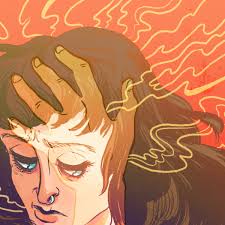if you are one of the millions of people who suffer from OCD, then you know that intrusive thoughts are a big part of the disorder. These thoughts can be extremely disturbing and can make it difficult to live a normal life. In this blog post, we will discuss 10 ways to help cope with intrusive thoughts.
Contents
What Are OCD Intrusive Thoughts?

OCD in full is known as Obsessive Compulsive Disorder and is not just about cleaning or having things organized. It can manifest in a range of ways, one being intrusive thoughts. OCD Intrusive Thoughts are unwanted and often frightening ideas that cause significant stress, fear, and anxiety for the sufferer.
The signs of intrusive thoughts can be hard to recognize, but some common symptoms include difficulty concentrating, intrusive images and thoughts that won’t go away, feeling overwhelmed or out of control, and difficulty sleeping.
The good news is that there are ways to cope with these intrusive thoughts. It also reduces the amount of stress and anxiety felt.
Different Ways For OCD Intrusive Thoughts Help

When it comes to managing anxiety and intrusive thoughts, it can be difficult to know what steps to take. Here are 10 ways that can help cope with OCD Intrusive Thoughts:
1. Challenge the thought: When a negative or intrusive thought occurs, it’s important to challenge it by asking yourself if there is any evidence for why this thought is true. Asking yourself questions such as “what would I tell a friend in this situation?” can help put the thought into perspective and make it more manageable.
2. Practice mindfulness: Mindfulness helps us become aware of our thoughts without judgment and can be an effective way of learning how to cope with intrusive thoughts when they occur. Mindfulness techniques like deep breathing and meditation can help to reduce stress and provide some much-needed moments of clarity.
3. Exercise: Exercise is a great way to release endorphins and helps keep your mind and body occupied with something positive. It’s a great way to manage intrusive thoughts as it gives you something else to focus on than the intrusive thought itself.
4. Distraction techniques: When an intrusive thought occurs, it’s important not to dwell too much on it or try to push it away. Instead, using distraction techniques like engaging in activities or talking with friends or family can give your mind something else to focus on instead of the intrusive thought itself.
5. Cognitive Behavioral Therapy (CBT): CBT has been proven to be effective in helping manage intrusive thoughts and anxiety. This type of therapy looks to change negative thought patterns into positive ones through various techniques such as thought-stopping and reframing.
6. Write down the thought: Writing down the intrusive thought can help put it into perspective and make it less overwhelming. It also allows you to look at why you had the thought in the first place, giving you a chance to reflect on what might be causing it.
7. Talk about it: Talking with family or friends about your intrusive thoughts can help normalize them and make them less scary. When we keep our thoughts inside, they can become more overwhelming – talking about them can help ease some of that burden. Also, talking to a mental health professional can help provide further support and insight into why the thoughts are occurring in the first place.
8. Practise relaxation: Practising relaxation techniques like progressive muscle relaxation and yoga can help manage stress levels and reduce intrusive thoughts.
9. Get enough sleep: It’s important to make sure you get enough sleep so that your mind is rested and better able to cope with intrusive thoughts.
10. Make time for yourself: Making time for yourself is an important way of managing intrusive thoughts as it allows you to take some much-needed moments away from worrying or overthinking. Whether it’s taking up a hobby, going for a walk, or spending time with friends – it’s important to give yourself the time and space to relax and feel refreshed.
These are just some of the ways that can help cope with OCD intrusive thoughts. It’s important to remember that everyone is different so what works for one person may not work for you – it’s about finding the right balance for you.
Different Sources To Get OCD Intrusive Thoughts Help

Various sources can provide help with OCD intrusive thoughts. The most important factor is to find the right one for you. Here are 10 ways to get help:
Support Groups
One of the best ways to get help is by joining a support group. This can be either online or in-person, and it will provide an opportunity to connect with others who are going through the same struggles as you. It is also a safe space to express your thoughts and feelings without judgment. Also, the support and encouragement from a group can be invaluable in helping you cope with OCD intrusive thoughts.
Online Resources
Websites such as Mental Health America provide helpful online resources to learn more about OCD intrusive thoughts and how to manage them. Also, there are plenty of online forums where you can connect with other people who have similar struggles, providing an outlet for support and understanding.
Medication
Medication can also play an important role in managing OCD intrusive thoughts. Medications such as SSRIs and SNRIs have been known to help reduce obsessive-compulsive behaviors and increase serotonin levels in the brain, thus providing relief from intrusive thoughts. However, you must consult a physician before taking any medications for OCD intrusive thoughts.
Therapy
Seeking help from a therapist is another great option for those dealing with OCD intrusive thoughts. A therapist can provide specialized care tailored to individual needs that will help recognize triggers, manage symptoms, and develop coping strategies. Some therapists may even specialize in Cognitive Behavioral Therapy (CBT) which has been proven effective for treating OCD intrusive thoughts.
Self-Help Books
For those who prefer to tackle their issues independently, self-help books offer valuable insight into living with OCD intrusive thoughts. These books can provide strategies for managing symptoms and offer psychological advice on how to cope.
Some of the self-help books to look into are “The OCD Workbook” by Bruce Hyman and Cherry Pedrick, and “Brain Lock” by Jeffrey M. Schwartz.
Conclusion
OCD intrusive thoughts can be difficult to cope with, but it is possible to manage them to lead a more fulfilling life. It is important to seek the help of a qualified mental health professional when struggling with OCD intrusive thoughts, as they can provide support and guidance. Additionally, there are many techniques and strategies that you can use on your own to help cope with intrusive thoughts.
Also, it is important to stay mindful of your intrusive thoughts, and not to allow them to control your life. Remember that you are in control and that you can use the tips mentioned in this article to help you manage these difficult experiences.
For more information and guidance, please contact OCDMantra. OCD is a mental health disorder characterized by obsessions and compulsions. If you have any queries regarding OCD treatment, ERP therapy experienced therapists at OCDMantra can help: Book a trial OCD therapy session.


